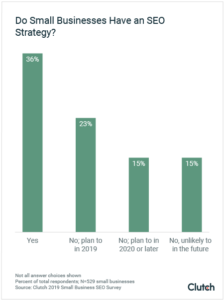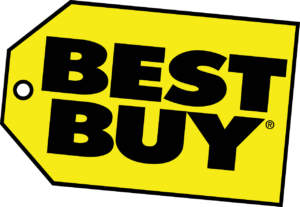Corporate SEO: Best Practices for Large Organizations and Brands
Corporate SEO ensures that a strong brand can stay competitive in the ever-changing landscape of search engine results.
For many years, corporate executives saw search engine optimization as a strategy rather than a necessity for online success. But today, SEO efforts are becoming a cornerstone for most major corporations as they compete for customers and top spots in the SERPs.
This is because the digital landscape is a battlefield full of both small and large companies. Corporate SEO ensures that a strong brand can stay competitive in the ever-changing world of content marketing and page rankings.
The fluid nature of search engine results are a big part of why so many large companies are investing in an enterprise SEO campaign. Plus, the resources of big corporations are usually plentiful enough to support an in-house SEO team or to hire the help of an outside SEO agency.
Typically, hundreds or thousands of employees work for these larger companies. There are likely also hundreds, or in some cases thousands, of web pages associated with corporate websites. To keep up with the competition online, any SEO platform for these large websites should include on-page content optimization. This will not only enhance any larger company’s SEO performance, it will also organize mass amounts of content to provide a better user experience for searchers.
It’s common knowledge that the higher a brand name or company ranks in Google results, the more likely someone searching for services or goods within that niche will click on the company website that occupies the first place in the SERPs. If the difference between consumers finding one company over another is simply by where the company can be found in search results, that makes establishing an SEO program one of the most important tools in any corporate marketing plan.
Not only does an enterprise SEO solution let corporations boost their own brand name, but achieving these spots over competitors and third-party sites is a great way to prevent attacks to company reputation. Large companies with comprehensive brand name recognition are easily susceptible to ranking alongside third-party sites like news organizations or blog posts that include inaccurate company messaging or detrimental information that can’t necessarily be removed by tangible action or authorization.
So rather than allow clickbait articles or competition to dictate a company’s online narrative, SEO-rich content creation allows enterprises to tell their own story.
Implementing SEO training for a large enterprise organization, then, can strengthen every aspect of a corporate marketing and sales plan. Let’s go over what makes enterprise SEO one of the most effective ways to improve a corporate website’s performance and visibility, increase a company’s reputation in the digital world, and convert more curious internet searchers into sales, because organic search directly translates to an increase in ROI and conversions.
To begin, it’s important to make a distinction about what separates SEO strategies for large organizations apart from those utilized by smaller businesses and bloggers.
What Makes SEO for Corporations Unique?
There’s a clear distinction between the strategy of implementing enterprise SEO efforts and planning seo programs for smaller companies. If you’re working for a large business, then your needs are far different from others engaging in SEO practices for a startup brand or blog. Enterprise-level organizations are major companies with hundreds of employees, large websites with thousands of pages and elements, and well-established brand name recognition among target audiences.
Because of this, some traditional marketing professionals assume smaller and emerging companies don’t pose a threat online. But the reality is that the challenges are only more complex and numerous as a company increases their digital presence. An enterprise website is going to have a huge number of pages, often sending consumers and visitors to a number of different features, services, and types of content.
How is someone who is just a searcher on the web supposed to make sense of it all? They can, but only if the company has a robust SEO team providing the insights and project management necessary to keep website content optimized as the company grows and scales.
The Challenges of Corporate SEO
Competition Increases
The competition is only getting savvier when it comes to digital marketing and search engine optimization. Everyone from local business to industry titans are now competing for customers and website traffic. In fact, the number of small businesses with an SEO strategy was expected to grow 23% in 2019. The two metrics are one-in-the same: If people are seeing your web content, then they are seeking out your service or product.
Additionally, organic traffic for a small business might be a matter of a few hundred visitors. Enterprise sites, though, are dealing with thousands and thousands of site visitors. The math is simple: a greater volume of visitors means more potential sales. This creates the challenge of keeping up a certain volume of sales to maintain market shares with nearly every other competitor attempting to draw attention to their sites.
If increasing search engine performance connects a corporate site to thousands of more potential customers, then the need for a proper enterprise SEO platform and implementation of best practices is mandatory.
Unfortunately, the corporate world has been slow to catch up to SEO standards and practices.
Getting Executives on board with SEO Initiatives
Another unique challenge is getting executives and stakeholders across different departments and all levels of management to see the value of SEO work. For some executives, a lack of familiarity with SEO concepts, as well as their significant impact, can lead to a reluctance to invest in these initiatives.
Other internal team members might understand its importance, but fail to recognize that meaningful SEO results require large-scale strategies rather than simple keyword research and content rewrites. The best way to approach this hurdle with executives is to educate them on the results of SEO and provide case studies of why it has proven effective.
Why the Corporate World Drags its Feet in SEO
Simply put, some team members don’t value SEO as much as other traditional marketing channels. Many executives are in disagreement with the role SEO should play in enterprise marketing and sales.
Plenty of large enterprise executives also overestimate how strong their brand’s positioning is in the SERPs. But in reality, Google, Bing, and Yahoo search results can change quickly and are far from static. This overconfidence can lead to a slower ramp-up of crucial SEO efforts like page optimization, which (because larger companies have hundreds of landing pages) can put corporations without an SEO team far behind.
There can often be a lull in accepting new changes to a marketing strategy, especially when things are going well for the company. But as we’ve learned in the digital age, it’s not enough to keep up–staying ahead and being proactive is the true secret to keeping a hold on the market.
How to Approach the Challenges of Corporate SEO
A lot of digital marketing professionals assume that SEO is all about keywords, but keyword use is not enough to stand out in the SERPs anymore. The real challenge to enterprise SEO isn’t competing in highly contested search results, it’s much more about finding a target audience that uses more specific search terms, those that are more likely to result in conversions.
Target Long-Tail Keywords for Increased Conversions
Let’s say an enterprise sells shoes online. Simply seeking out keywords about shoes will not effectively build their site rankings. The goal of a keyword strategy isn’t top-tier keywords to begin, but instead scoping out an effective striking distance. Some keywords are already oversaturated, and far too hard to penetrate in the initial rollout of an enterprise SEO initiative. Instead, target long-tail keywords that pertain more to your unique place in the market.
So, using our shoe retailer as an example, “buy shoes online” might be too broad and crowded, but “men’s and women’s dress shoes” might be far more beneficial to target. The reason a search query like this yields stronger conversions from organic traffic is because these users have more specific search intent.
Long-tail keywords allow search engines to narrow in on the most relevant information to a more detailed search. By intentionally targeting more specific keywords or phrases, enterprise companies can reach the specific segments of their niche audience they had in mind for certain aspects or products featured in their web content.
Whatever makes a company matter to a consumer, or meets their specific needs, should be what guides keyword research. Any larger company needs to be an expert in their industry, and potential customers want to see that expertise through specific search results that directly meet their intentions.
Embrace Data-Posturing
Some newcomers to the enterprise SEO world find their keywords and then stay put. Unfortunately, that’s going to quickly become an ineffective strategy. Even in a matter of a few days, search engine results change and certain urls rise and fall as coding, algorithms, and competitor’s SEO efforts become more refined.
From a search engine’s perspective, they seek to find ways to make their service as effective to users as possible. An enterprise organization’s goal with SEO then needs to be making its content also useful to search engines. This means careful consideration of website results, page speed, web development, keyword performance, and digital analytics will be a weekly – and in some cases daily – practice of marketing analysis.
Understand the Hefty Undertaking
Another important factor in the approach to search engine optimization for enterprise organizations is understanding the scope of the SEO work in store. Major companies usually have hundreds of web pages, all of which need to be optimized (and re-optimized) to ensure constant presence in search engine rankings.
Prepare to Scale
It’s tough enough to optimize a few blogs on a small business site, but the scalability of a corporate SEO plan is going to make optimization a much larger project. The good news is that sales are more scalable when optimizing a corporate site, but the work needs to be done up front to set up for successful visitor conversions.
Get an Entire Team on Board
To accomplish an effective enterprise SEO strategy, the goal can’t just pertain to digital efforts. In fact, making sure to have meetings with employees in charge of these efforts — whether an in-house SEO team or enterprise SEO agency–makes a huge difference.
Hiring an SEO manager, assembling a team that excels in various elements of a digital marketing plan, and setting clear workflow expectations and goals, can make optimizing and maintaining hundreds or thousands of landing pages far easier.
Corporate SEO Trends to Watch
Almost every corporation is rolling out some sort of SEO marketing plan. For that reason, competition is as fierce as ever. Leveraging trends offers your corporation a way to edge out the competition and excel, which is why it’s important to keep up with new SEO resources and practices.
SEO as a Necessity for your own Web Site
Unfortunately, many still see SEO as an optional marketing strategy instead of a necessity, because in the end, their role is to make decisions – not problem solve.
Many corporate marketing professionals continue to focus on desktop versus mobile web traffic. But the real impact isn’t how users are getting to their site, it’s how they are engaging with it. Google alone is responsible for 75% of the traffic on enterprise website, but conversion rates either thrive or falter depending other elements of SEO, like a good ui/ux design and page speed. These on-page SEO factors are a necessity and need to be treated as such.
Mobile as a Growing Movement
Nowadays, investing in mobile applications is the move to make for enterprise companies. Mobile solutions are not only the most effective way to target the most users, but also mobile-based interfaces are seen as much more effective than mobile-friendly interfaces.
It’s not enough to offer compatibility; successful enterprise SEO in today’s digital world need to target mobile users more directly.
Putting Money Where the Results Are
What’s the best way to make something that works operate even more efficiently? Invest in those effective efforts! Enterprise SEO works, and countless large-scale businesses invest more in in-house SEO year after year. There’s a good reason: SEO is a proven tool that any corporate operation needs to succeed in a digital landscape.
Organizations that spend more than $20,000 on SEO efforts are the leaders in SEO innovation in the corporate space, and it’s no secret why. Investing in essential tools yields effective results, and the data doesn’t lie.
Influencer Marketing for Enterprise Businesses
What’s an organic way to grow your reach to consumers? Social media.
It isn’t just the most successful strategy, it’s the most cost-effective. Under the umbrella of social media strategies, influencer partnerships are quickly becoming a popular option.
Some enterprise companies see influencer marketing as more of a start-up tactic, but it’s actually incredibly successful for large companies as well.
McDonald’s, for example, launched a campaign with Travis Scott that encouraged his fans to create a trend on TikTok posting their McD X Scott purchases with other hashtags. Launching an influencer campaign on a seemingly untraditional platform for an enterprise allowed the company to reach an entirely new audience and attract a fresh group of young consumers.
Case Studies in Corporate SEO Best Practices
Best Buy
For a long time, the retailer only thrived in their big box stores, losing business to competition online. One tactic they moved away from was keyword stuffing, a method in which some companies use a keyword too often. When keyword stuffing occurs, Google and other search engines start to hide the content as non-rich.
So, Best Buy took on a new strategy. While still featuring keywords in their product description pages, they started including expert information. In comparison to other retailers, they immediately took on the image of being the experts in their niche market. This helped increase their credibility to consumers while also staying SEO-friendly.
Microsoft
An angle Microsoft opts for in their landing pages is technical SEO usage. In their web pages on projects and initiatives happening in their research development labs, they utilize internal links to enrich the user experience of site visitors.
So, if you end up on Microsoft’s website looking up cloud technology, you can learn all that you want to know about the concept by navigating through additional landing pages on the Microsoft website. For any question a user might have, Microsoft made sure they had a content piece to provide clarity.
It’s a seemingly small tactic, but becoming your own hub for industry information makes users more likely to stay longer, seek out your products and services, and see a corporate brand as a personal resource.
How Corporate SEO is Changing the Web
In more ways than one, enterprise SEO is changing the way search engine marketing is done.
Re-Optimize Rather than Start from Scratch
Firstly, re-optimizing current web pages makes sites that users have already used for years and easier to navigate (and easier for search engines to index). Not only does re-optimizing important pages save corporate marketing teams the time it takes to rewrite fresh content, but it also builds on past successes rather than abandoning them.
For example, if your services pages perform well without an SEO plan, why would you tear everything down to start from scratch? Re-optimization is providing corporations with thousands of web pages on their SEO to-do list, and it provides a more manageable path forward.
Internal and External Links Matter for SEO
As mentioned in the Microsoft case study, linking is also changing the way internet users access information. If a corporate site wants to maximize their credibility and user-perceived expertise, links are vital enterprise SEO tools.
Internal linking creates a kind of internal directory, while backlinks connect users to your own website via links from other webmasters’ web pages. External linking connects users to useful info on a given topic, which reinforces the perception of an enterprise company as informed and engaged within their market.
In addition, internal linking, as seen with Microsoft, shows users they can learn everything they want from the company’s website. Even for general information on a feature or topic, users can stay on a corporation’s website instead of creating a second search when the company’s internal linking is strong.
It’s important though for larger website’s to make sure they don’t have duplicate content, which even less used search engines like Bing and Yahoo will penalize for.
Don’t Lose out on Local SEO Conversions
Lastly, newcomers to corporate SEO think content needs to be general and fit the largest audience possible. But if enterprise marketing teams are adequately staffed and savvy, then the focus on local SEO will also help optimize what users desire from more specific content. It’s hard making a company spread across multiple locations, states, and even countries seem relevant to an individual community. Taking the time to produce local listings helps to bridge that gap effectively.
How to Get Ahead in Corporate SEO
Getting ahead in SEO as an enterprise doesn’t happen overnight. It won’t even happen within a single SEO campaign. No matter the time it takes, getting ahead is more about consistent changes and the ability to adapt. It is never a one time effort.
Optimize Images Visually and through Alt Text
Optimizing images is one way to get ahead of the competition. From alt text which connects internet searches to corporate web pages to simply catching the audience’s eye, images pack a punch in the digital world. Strategically using images to attract attention and keep readers on a domain for a longer period of time ultimately translates to more conversions.
Create and Use a Template for all Content Pages
Another way to visually stimulate an audience is content uniformity on landing pages. Everything from fonts and layouts to content length and overall format should be consistent throughout enterprise web pages. A template for this content is essential, and allows multiple marketing employees to write on various topics while ensuring the content will stay consistent across writers and topics.
Maintain Your Site’s User Experience and Speed
Nothing kills an enterprise company’s web traffic like slow and sluggish load times and performance. Your site needs to be fast, efficient, and user friendly. If it’s not, then users won’t stay very long, leading to higher bounce rates and Google triggering your pages as non-rich, leading to decreased web rankings. In fact, 40% of users will leave a site completely if it’s not loaded in three seconds.
If site speeds come down to digital infrastructure, find out how to fund improvements fast. Otherwise, the increased leads and eventual sales that can come from corporate SEO initiatives won’t ever be reflected in your company’s bottom line.
Simplify Outreach Process with Automation
With those last two points in mind, enterprise companies should consider adding automated processes to their websites. There are likely tasks that employees are completing which could be handed off to a SEO provider’s software. Likewise, allowing automated processes to run certain aspects of site operations usually speeds things up on the user experience end.
Final Thoughts on SEO Practices for Corporations
It’s never too late to begin a comprehensive SEO strategy. If a corporation is behind, they can hire an SEO company that’s a good fit for their organizational size.
There will still be some executives who don’t know the importance of search rankings and keyword use, so anyone getting on board with enterprise SEO in 2020 is far from the back of the pack.
Begin first with a review of web rankings, and then work keyword optimization and a broader SEO strategy into the mix. Eventually, do an evaluation of backlinks to remove any spammy links.
With data to guide you, and a multitude of resources and tips available above, it’s time to make the real results of enterprise SEO strategies work for your company.
Some additional questions to consider for your corporate SEO strategy:
What enterprise SEO strategies stood out most to the unique placement of your company within a niche market?
What role do you think SEO could play in firming up a few weak spots for your company’s digital presence?






















































































